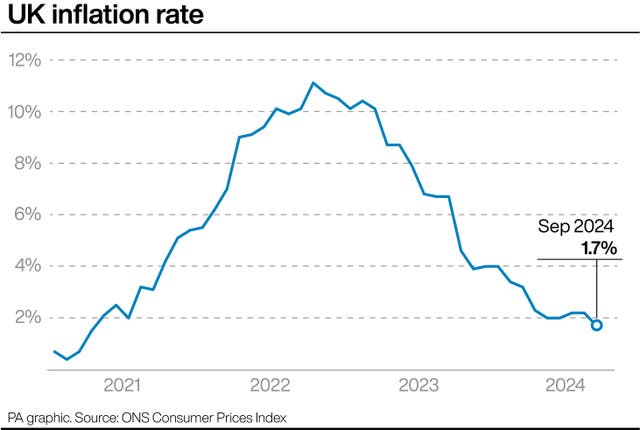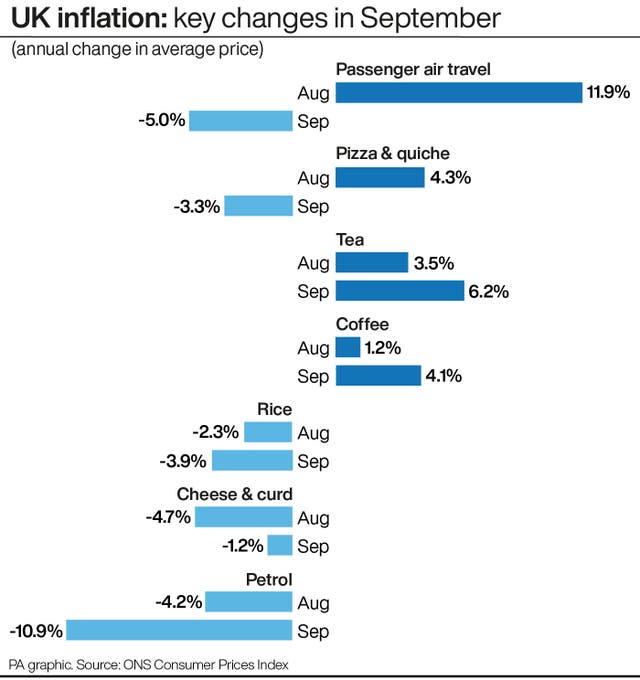The drop last month in the overall rate of inflation to 1.7% was driven by large changes in the cost of air travel, fuel and household staples such as pizza and rice – though some items saw prices continuing to rise.
The biggest movement was in the average cost of passenger travel by plane, which fell by 5.0% in the year to September, having previously jumped sharply by 11.9% in the 12 months to August.
Other products seeing a switch from rising to falling prices include pizzas and quiches, the cost of which dropped by 3.3% in the 12 months to September after increasing 4.3% in August; carpets and rugs, down 2.9% last month after rising 0.6% in August, and butter, down 0.2% after increasing 0.9% in August.

Petrol and diesel both recorded a larger annual fall in price in September than in August, with petrol down 10.9% last month compared with a drop of 4.2% in August, and diesel down 9.9% compared with a drop of 2.2%, according to figures published by the Office for National Statistics (ONS).
A similar trend was seen in a handful of everyday household goods, with the average cost of rice falling more steeply in September (down 3.9%) than in August (down 2.3%), as did the cost of bed linen (a drop of 2.2% in September compared with a fall of 0.8% in August) and crisps (-2.2% in September, -1.1% in August).
By contrast, some items saw prices falling less slowly last month than in August, most notably cheese, the average cost of which dropped 1.2% in the year to September, having enjoyed a much larger decrease of 4.7% in the 12 months to August.

The price of fish was down 1.6% in September, a smaller annual drop than 3.0% in August, and it was a similar story for the average cost of second-hand cars (down 6.3% last month after falling 6.6% in August) and women’s shoes (down 2.4% in September, down 2.6% in August).
A few items swung from negative to positive inflation, such as cleaning equipment, where prices rose last month by 4.3% having fallen in August by 3.3%; fruit and vegetable juices, up 4.4% last month after a drop of 0.4% in August; and children’s footwear, up 3.7% in September following a drop of 1.1% in August.
There were also instances of inflation accelerating, including the average price of coffee (up 4.1% in the year to September, up 1.2% in the year to August); tea (up 6.2% last month, up 3.5% in August); and breakfast cereals (up 2.8% last month, up 1.3% in August).
Below is a list of examples of how the Consumer Prices Index (CPI) inflation rate has either eased or accelerated.
Two figures are listed for each item: the average rise in price in the 12 months to August, followed by the average rise in price in the 12 months to September.
– Examples where inflation has eased, ranked by the size of the change:
Passenger travel by air: August up 11.9%, September down 5.0%
Olive oil: Aug up 40.8%, Sep up 33.0%
Pizza & quiche: Aug up 4.3%, Sep down 3.3%
Carpets & rugs: Aug up 0.6%, Sep down 2.9%
Rice: Aug down 2.3%, Sep down 3.9%
Women’s clothes: Aug up 3.9%, Sep up 2.4%
Sugar: Aug up 5.8%, Sep up 4.4%
Butter: Aug up 0.9%, Sep down 0.2%
Crisps: Aug down 1.1%, Sep down 2.2%
Men’s footwear: Aug up 0.6%, Sep down 0.3%
Hotels & similar accommodation: Aug up 3.1%, Sep up 2.2%
Ready-made meals: Aug up 2.1%, Sep up 1.4%
Bread: Aug up 2.2%, Sep up 1.6%
– Examples where inflation has accelerated:
Cleaning equipment: August down 3.3%, September up 4.3%
Fruit & vegetable juices: Aug down 0.4%, Sep up 4.4%
Children’s footwear: Aug down 1.1%, Sep up 3.7%
Pasta & couscous: Aug down 3.8%, Sep up 0.9%
Margarine & other vegetable fats: Aug down 2.6%, Sep up 1.7%
Yoghurt: Aug down 3.1%, Sep up 0.9%
Cheese & curd: Aug down 4.7%, Sep down 1.2%
Coffee: Aug up 1.2%, Sep up 4.1%
Tea: Aug up 3.5%, Sep up 6.2%
Fresh or chilled fruit: Aug up 1.8%, Sep up 3.8%
Breakfast cereals: Aug up 1.3%, Sep up 2.8%
Soft drinks: Aug up 1.5%, Sep up 2.9%
Passenger travel by train: Aug up 2.2%, Sep up 3.1%




Why are you making commenting on The Herald only available to subscribers?
It should have been a safe space for informed debate, somewhere for readers to discuss issues around the biggest stories of the day, but all too often the below the line comments on most websites have become bogged down by off-topic discussions and abuse.
heraldscotland.com is tackling this problem by allowing only subscribers to comment.
We are doing this to improve the experience for our loyal readers and we believe it will reduce the ability of trolls and troublemakers, who occasionally find their way onto our site, to abuse our journalists and readers. We also hope it will help the comments section fulfil its promise as a part of Scotland's conversation with itself.
We are lucky at The Herald. We are read by an informed, educated readership who can add their knowledge and insights to our stories.
That is invaluable.
We are making the subscriber-only change to support our valued readers, who tell us they don't want the site cluttered up with irrelevant comments, untruths and abuse.
In the past, the journalist’s job was to collect and distribute information to the audience. Technology means that readers can shape a discussion. We look forward to hearing from you on heraldscotland.com
Comments & Moderation
Readers’ comments: You are personally liable for the content of any comments you upload to this website, so please act responsibly. We do not pre-moderate or monitor readers’ comments appearing on our websites, but we do post-moderate in response to complaints we receive or otherwise when a potential problem comes to our attention. You can make a complaint by using the ‘report this post’ link . We may then apply our discretion under the user terms to amend or delete comments.
Post moderation is undertaken full-time 9am-6pm on weekdays, and on a part-time basis outwith those hours.
Read the rules here